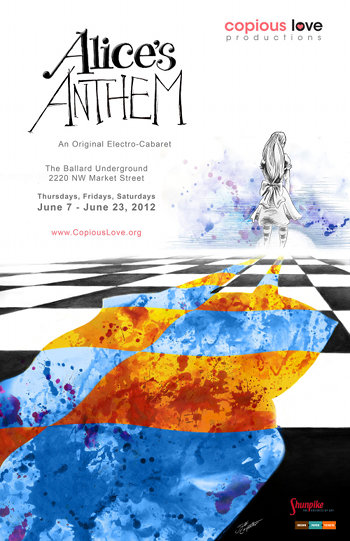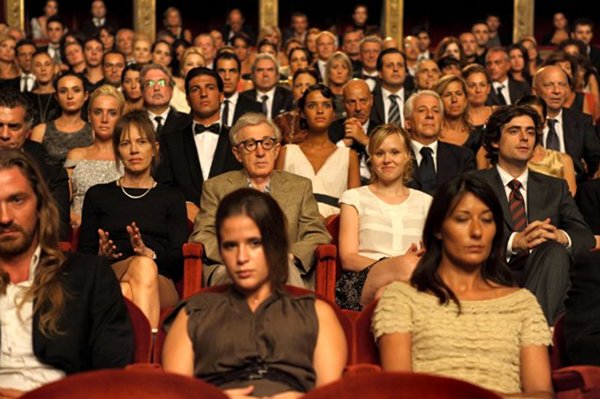Film Essent Archive for June, 2012
Review: To Rome with Love
Warning: Minor spoilers contained herein. But really, it doesn’t matter.
Like many of you, I have a love-hate relationship with Woody Allen that’s not unlike my love-hate relationship with Nic Cage. Both Allen and Cage have this infuriating thing they do where they’ll make a film that makes you go, “Wow! Now THAT’s why I love Woody Allen/Nic Cage!” and then Nic Cage will turn around and make some steaming pile of dung like Knowing or Ghost Rider: Spirit of Vengeance, and Woody Allen will make some mess like To Rome with Love that doesn’t quite gel, and you sigh and shake your head. But you forgive them, you don’t hold a grudge forever just because Nic Cage has a flaming skull for a head or Woody Allen’s made an episodic clunker. Hell, everyone’s entitled to a bad day, right?
One of the four interwoven (but not intersecting) vignettes in To Rome with Love features Allen as Jerry, a retired opera director who discovers that his soon-to-be son-in-law’s simple mortician father is secretly a brilliant tenor — so long as he’s singing in the shower. In many ways this character feels like vintage Woody Allen, so much so that a forgiving audience might be inclined to play along and chuckle appreciatively when he tosses off a one-liner about being afraid to fly because he’s an atheist. Judy Davis plays Phyllis, his psychiatrist wife, which allows Davis to drily shoot off some lines of her own that sound like they might have been culled straight from one of Woody Allen’s therapy sessions. Not that I’m saying Woody Allen needs therapy, but it’s easy enough to imagine him talking through screenplay ideas while reclining on a psychiatrist’s couch, isn’t it?
The underlying theme of To Rome with Love, I guess, is supposed to be about chance, and the way people’s lives get shifted or set in motion by random happenings. So Jerry’s daughter Hayley (Alison Pill) and her fiance, Michelangelo (Flavio Parenti), meet cute when she stops him to ask directions, thus setting in motion the events that lead to Jerry hearing Michelangelo’s father singing in the shower. Roberto Begnini shows up in another segment as an everyman whose life is turned on end when he inexplicably finds himself an instant celebrity being hounded by paparazzi and pop press — a segment that could have, with a bit more attention paid to the writing, been very clever. Hell, by all rights it should have been brilliant: Begnini is a comedian gifted at the farcical, and Allen himself has certainly had enough experience dealing with celebrity to have some smart things to say about it. Instead it feels tossed off, awkward, as if Allen just told Begnini to take the idea and run with it, but never quite nurtured it enough to make it come together properly.
The weakest bit involves a drawn-out, insipid tale of a naive newlywed couple who get separated in an unfamiliar city by perhaps the most contrived set of circumstances ever written in a Woody Allen script. Milly (Alessandra Mastronardi), the wife, leaves the hotel to get her hair done before dinner with some of her new hubby’s uptight relatives, gets lost, loses her phone, and blah blah blah blah eventually falls into bed with a movie star and a burglar. Oops, I hate it when that happens to me. But it’s all okay because her brand-new hubby not only bangs Penelope Cruz (it’s okay, she’s playing a hooker, and she was already paid for) AND passes said hooker off as his wife when his uptight relatives walk into his hotel room (without knocking? Who does that?) when he’s in his boxer shorts and accidentally in bed with her.
And then there was the bit I found to be both the best segment of the film, and the most infuriating by virtue of the potential it had that wasn’t developed. It revolves around architect John (Alec Baldwin), visiting the city where he lived briefly in his 20s, who randomly meets Jack (Jesse Eisenberg), a young architect who lives in the same neighborhood where John once lived. Jack lives with Sally (Greta Gerwig), who’s a nice girl. So nice that you know Jack’s going to do something to screw it up — which he does, of course, when Sally invites her femme fatale friend Monica for a visit. Jack may or may not be John’s younger self — I thought it was obvious he was, but the older couple next to me was having a spirited debate about that point on their way out of the theater.
Now the second biggest problem this vignette has is the casting of Ellen Page as Monica. Don’t get me wrong, I love Ellen Page, and on the surface she has the frank, open delivery that the part calls for. But this part also calls for someone a little more sultry, who when she talks about a lesbian encounter you can picture that happening and it makes you feel all tingly; Page just can’t deliver on that here. The biggest problem with this vignette, though, is that it really needed to be the entire film, that it needed to be for Rome what Match Point was for London, and what Vicky Cristina Barcelona was for Barcelona, and what Midnight in Paris was for Paris.
If Allen had focused just on this story, and cast Scarlett Johansson — ooh! — or maybe Elizabeth Olsen, instead of Ellen Page in the part of Monica, and if he’d taken the time to hone it the way he’s certainly capable of, he could have had something much closer to great Woody Allen here than what he ends up with by stitching together four half-baked ideas, and it’s that — that loss of the potential to do something great — that I find truly frustrating here. Allen works at this impressively frenetic pace, churning out films right and left as if, like Jerry, he’s trying to fend off death and retirement with work. Maybe from a film history perspective it will be more interesting fifty years from now to compare Allen’s lesser works to his greater ones, but dammit, at this point in his long and prolific career, I just care more about Woody Allen making what he thinks is the best film he has in him than tossing out a mediocre one. And this just isn’t quite his best.
5 Comments »Review: Take This Waltz
Note: This review originally ran as part of our TIFF 2011 coverage. Take This Waltz opens this weekend in NY, with a limited release to follow July 6.
Take This Waltz completely slayed me.
With her 2006 feature film debut, Away from Her, Sarah Polley examined the intricacies of a long-term relationship through a couple married for many decades, who were faced with one of them dealing with early-onset Alzheimer’s. In that film, she explored marriage, infidelity, and commitment with a deeply innate understanding of the complexity of relationships that was remarkable for a director who was, at that time, only 27.
Five years later with Take This Waltz, she explores a similar theme through a different lens, with a story that revolves around what happens to the marriage of a late-20s couple, Margot (Michelle Williams) and Lou (Seth Rogen), when Margot makes a connection with Daniel (Luke Kirby), a handsome, charming neighbor who gives Margot the attention she craves from her well-intentioned but distracted husband.
Among the many things Polley nails with both her script and direction is the way in which we tend to grow complacent in long-term relationships. That’s just the way it goes, right? At the beginning, when things are budding and new and fresh, there’s a palpable excitement to this connection you’re making with another person, when the sexual chemistry is so intense it feels like it colors the world. You feel tingly and giddy and everything suddenly seems to be made brighter, more vivid, by the feelings flooding through you that you can’t quite explain or get a handle on.
Read the full article »
(60) Days of Summer
Today was the first official day of summer for us; last day of classes was last Friday, but since Luka was in the hospital Monday and Tuesday I’m not counting them as summer. Usually, summer is a time I set aside for being a little lazy and spending a lot of time relaxing with my kids before Toronto and awards season. This year, though, there’s just so much I want to get done and this is the time to do it. My plate is very full right now, and it’s a good thing I’m skilled at multitasking and being well-organized (yet another unexpected side benefit of my years as a project manager in tech).
Right now I’m working with some amazing women to organize a massively structured Homeschool PTSA that could end up being a model for similar groups nationwide. It’s exciting to be breaking new ground, and while it’s a lot of work and a bit of a time and energy suck, it’s also very important work we’re doing here, in building this foundation of connection for homeschooling families in our region. It needs to be done, and we’re trying to do it well; fortunately we have some formidably brainy businesswomen on our Board and we are kicking butt and taking names getting things organized.
I’m very excited also about an indie film collective I’m working on with a carefully curated group of ridiculously talented Northwest filmmakers. There is so much potential in what we’re starting to work on, if we can just organize it right and maintain a commitment to the ideas we’re batting about. Much more on that later as it starts to gel.
My other major summer project, work-wise, is finishing up two scripts I’m working on, and getting a good start on a third. I want to be work-shopping and peer-reviewing the script I want to develop first by August, which is an ambitious deadline given that I want to get in a couple of revision passes myself before I bring it to a group of peers. I’m also going to be doing make-up design for Alice in Wonderland, which means two casts of roughly 70 faces to get fantasy make-up on, fast. But I’ve done make-up for Alice before, and it’s one of my favorites to design. Besides which, my kids are all in the play so I have to be a the theater for tech week anyhow. Might as well be doing something fun, right? Oh, yeah, and I got called for jury duty on July 5.
And then I do intend also to spend some lazy days at the beach with my kids, and we’re going camping a couple times with some groups of families with kids. I’m really looking forward to both those trips, and to hanging out with some good friends while our kids get to spend a few days unplugged, playing in the sand, frolicking in the ocean, fishing, and climbing trees.
Theater: Alice’s Anthem
 This weekend we finally made it over to Ballard to check out Alice’s Anthem, an original musical adaptation of Alice in Wonderland. The play was produced by Copious Love Productions, an impressive little theater collective in Seattle that my daughter Meg (who did the costumes and makeup design) and son-in-law Dick (in the ensemble) are involved with. I can’t claim to have a great deal of objectivity about the folks involved in Copious Love, so I won’t; this isn’t a formal review, therefore, just a write-up of my thoughts about the play after seeing it twice.
This weekend we finally made it over to Ballard to check out Alice’s Anthem, an original musical adaptation of Alice in Wonderland. The play was produced by Copious Love Productions, an impressive little theater collective in Seattle that my daughter Meg (who did the costumes and makeup design) and son-in-law Dick (in the ensemble) are involved with. I can’t claim to have a great deal of objectivity about the folks involved in Copious Love, so I won’t; this isn’t a formal review, therefore, just a write-up of my thoughts about the play after seeing it twice.
SIFF 2012 Dispatch: It’s a Wrap
 It never ceases to amaze me, just how quickly 25 days of film festival awesomeness can fly by. I usually cover SIFF inside and out, but this year having a film in the fest, with industry events on top of press stuff, and going off to Oklahoma City most of last week to support Bunker‘s first screening at the deadCENTER Film Festival, and all the usual end-of-school-year kidstuff, all conspired to keep me from getting to as many screenings as I intended.
It never ceases to amaze me, just how quickly 25 days of film festival awesomeness can fly by. I usually cover SIFF inside and out, but this year having a film in the fest, with industry events on top of press stuff, and going off to Oklahoma City most of last week to support Bunker‘s first screening at the deadCENTER Film Festival, and all the usual end-of-school-year kidstuff, all conspired to keep me from getting to as many screenings as I intended.
I’ve been covering SIFF for a many years now and I have to say, I think this is one of the strongest years programming-wise they’ve had (and I don’t say that just because my daughter Neve was an intern on the programming staff this year, or because they programmed my film). Over and over in conversations I had at parties or standing in line, the recurrent theme was how impressed people were with this year’s overall slate. Sure, there were a few films that some folks weren’t crazy about, but if a fest is making everyone happy, they probably aren’t curating as well as they should, right? For me, the best fests offer a diverse slate of programming and counter-programming, balancing accessible crowd pleasers with films that tackle more challenging subject matter or style. The SIFF programmers, perhaps in part because they have 25 days to work with, always do a solid job, but this year they just really hit the sweet spot.
Read the full article »
SIFF 2012 Review: Fat Kid Rules the World
 I dug Fat Kid Rules the World a lot. I went into this screening thinking, “Oh, great. Jacob Lysocki’s playing a fat high school student again? And directed by Shaggy?” Aza Jacobs Terri was a great little film, in no small part due to Wysocki’s subtly wrenching performance as the depressed, overweight teen. So why make a movie that immediately evokes that by casting the same actor in a similar setting? But in all fairness, this is a completely different story, both in plot and tone, and Wysocki here is portraying a completely different, but equally nuanced fat kid. And Lillard, as it turns out, isn’t a half-bad director. Actually, he’s pretty darn good.
I dug Fat Kid Rules the World a lot. I went into this screening thinking, “Oh, great. Jacob Lysocki’s playing a fat high school student again? And directed by Shaggy?” Aza Jacobs Terri was a great little film, in no small part due to Wysocki’s subtly wrenching performance as the depressed, overweight teen. So why make a movie that immediately evokes that by casting the same actor in a similar setting? But in all fairness, this is a completely different story, both in plot and tone, and Wysocki here is portraying a completely different, but equally nuanced fat kid. And Lillard, as it turns out, isn’t a half-bad director. Actually, he’s pretty darn good.
Read the full article »
SIFF 2012 Dispatch: Review Roundup
Here’s one last roundup of some more films from this year’s SIFF that I’m finally getting around to writing up …
Charming, lightly funny tale of Jenn (Jenn Harris), a single, 30-something hot yoga instructor who decides she wants to grow up and have a baby, and Matt (Matthew Wilkas), her gay BFF who agrees to father her child. In the wrong hands, this material would be completely one-dimensional and contrived, but writer-director Jonathan Lisecki (expanding off his 2010 short of the same title) manages to pull off a likable film in spite of it often feeling like an extended sitcom pilot. That’s not in and of itself a bad thing, by the way … if they’d sharpen the dialogue a bit and keep delving into all the potentially challenging issues of these characters having and raising a child, they could have a funny television series out of this.
Read the full article »
SIFF 2012 Reviews: Xingu and The Art of Love
Xingu
A compelling and gorgeously shot tale of three real-life brothers who were instrumental in the protection of indigenous Indian tribes in Brazil, Xingu, directed by Cao Hamburger (The Year My Parents Went on Vacation), tells a little-known and important tale, but suffers somewhat from trying to cover 18 years of story in 102 minutes. The film tells the tale of the Villas-Bôas brothers, Orlando, Claudio and Leonardo, who started out leading the charge of colonization across central Brazil, but fell in love with the diversity and richness of the Indian tribes they found there and instead led the charge to protect them from the impact of colonization by Whites.
Ultimately Claudio and Orlando Villas-Bôas were responsible for the creation of Xingu National Park, an indigenous-only park in central Brazil in 1961. It’s a tale of breathtaking scope, and one that American audiences are probably completely unfamiliar with, and it’s particularly relevant given that the continued deforestation in the Brazilian rainforest (problematic in and of itself) increasingly encroaches on diverse and unique way of life the tribes residing within the preserve have maintained.
There are moments in the film that feel like some storytelling was lost in the editing room. For instance, early on we see Claudio and Leonardo lie about their intelligence and literacy in order to get accepted into the military group that’s going to explore central Brazil, but we don’t know why they’re lying, and there’s never a reason given for why they wouldn’t have just enlisted by saying, “Hey, we have these skill sets, and I’d like to join this expedition.” And yet, in spite of presenting themselves as illiterate peons (unskilled laborers) to be a part of the expedition, when we next see them they are leading it. We see an officer who looks gloweringly suspicious of the brothers as they enlist, which foreshadows his involvement later, but this never really pays off later even when he reappears.
Read the full article »
SIFF 2012 Review: John Dies at the End
John Dies at the End, the much-hyped film adaption of the book of the same title by David Wong (a pseudonym for Cracked editor Jason Pargin), isn’t a great film … but it is a fun film for what it is. I mean, look. I saw some of the reviews out of Sundance and SXSW, wherein folks were bitching about the low-budget SFX in this film, so I went into this expecting it to be really, really schlocky. And it’s not. Yes, it’s true that there are times when its obvious director Don Coscarelli (Phantasm) is stretching the limits of a low budget to their max, and where you can see how much cooler the effects might have been given another million or ten here and there. So what?
Let’s appreciate what we have here: How ballsy was it for an independent director to take on shooting a project that many felt was completely unfilmable, on a low budget? It doesn’t hurt that Coscarelli has Paul Giammati anchoring the film as the skeptical reporter to whom Dave (newcomer Chase Williamson) tells a wild tale involving a street drug called “Soy Sauce” that shows the user a hidden world of monsters and doorways and the dead and time travel and invading aliens that incubate and hatch in a particularly gross (but cool) way. Also, there are naked people wearing disturbing, clownish masks, and if weird masks freak you out (hey, they do me) they might end up freaking you out in your dreams. Shudder.
Read the full article »
Copious Love for Some Smart Art
 I’m taking a brief pause from end-of-year kidstuff and SIFF happenings to tell you about something completely awesome. If you live in Seattle, you’ll thank me for telling you about it in time for you to put it on your calendar, if if you don’t, well, you’ll wish you did.
I’m taking a brief pause from end-of-year kidstuff and SIFF happenings to tell you about something completely awesome. If you live in Seattle, you’ll thank me for telling you about it in time for you to put it on your calendar, if if you don’t, well, you’ll wish you did.
Seattle is blessed with an abundance of awesome artiness, little conclaves of smart, interesting folks doing smart, interesting creative things. One such group here is Seattle’s Copious Love Productions, which I got to know about because the people behind it are friends of my daughter Meg and son-in-law Dick. After a couple of successful productions, Copious is gearing up for their biggest endeavor yet: An musical adaptation of Alice in Wonderland called Alice’s Anthem, which will feature all original music, written by Copious principal Tony Galivanes. Dick is in the cast, and Meg is on costume, hair and makeup design.
Read the full article »















